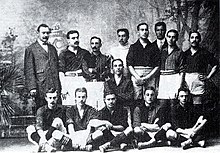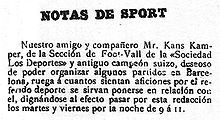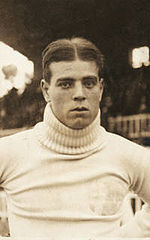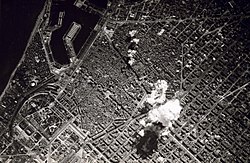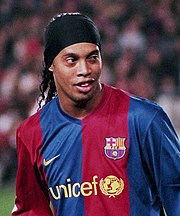History of FC Barcelona
[1] On 22 October 1899, Joan Gamper placed an advertisement in Los Deportes declaring his wish to form a football club; a positive response resulted in a meeting at the Gimnasio Solé on 29 November 1899.
[10] The stadium is regarded as the main element that helped the club grow in the 1910s and become a dominant team,[11] winning three successive Campionats de Catalunya between 1909 and 1911, three Copa del del Rey in four years between 1910 and 1913, and four successive Pyrenees Cup between the inaugural year in 1910 and 1913, which was one of the earliest international club cups in Europe since it consisted of the best teams of Languedoc, Midi and Aquitaine (Southern France), the Basque Country and Catalonia; all were former members of the Marca Hispanica region.
[13] As well as the aforementioned players acquired in the Marial presidency, Barça's first great team also had the likes of Amechazurra, Romà Forns, Pepe Rodríguez, Carles Comamala, and Jack Greenwell.
During the Gamper-led era, Barcelona won eleven Campeonat de Cataluña, six Copa del Rey and four Pyrenees Cups and enjoyed its first "golden age".
[36] On a rainy Sunday of 1951, the crowd left Les Corts stadium after a 2–1 win against Santander by foot, refusing to catch any trams, and surprising the Francoist authorities.
Barcelona restored some pride by beating Real Madrid 1–0 in the 1968 Copa del Generalísimo final at the Santiago Bernabéu – in front of Francisco Franco – with their coach Salvador Artigas, a former republican pilot in the civil war.
[45] Next to champions like Juan Manuel Asensi, Carles Rexach and Hugo Sotil, he helped the club win the 1973–74 season for the first time since 1960,[7] defeating Real Madrid 5–0 at the Santiago Bernabéu along the way.
His presidency was to last for 22 years, and it deeply affected the image of Barcelona, as Núñez held to a strict policy regarding wages and discipline, letting go of such world-class players as Diego Maradona, Romário and Ronaldo rather than meeting their demands.
At the start of the 1984–85 season, Terry Venables was hired as manager and he won La Liga with noteworthy displays by German midfielder Bernd Schuster.
The skinheads slowly transferred the Boixos Nois' ideology from liberalism to fascism, which caused division within the group and a sudden support for Núñez's presidency.
New stars emerged, however, such as Luís Figo, Patrick Kluivert, Luis Enrique and Rivaldo, and the team won a Copa del Rey and La Liga double in 1998.
In 1999, the club celebrated its centenari, winning the Primera División title and where Rivaldo became the fourth Barcelona player to be awarded European Footballer of the Year.
Long-serving coach Carles Rexach was appointed as his replacement, initially on a temporary basis, and managed to at least steer the club to the last Champions League spot on the final day of the season.
Despite better form in La Liga and a good run to the semi-finals of the Champions League, Rexach was never viewed as a long-term solution and that summer Van Gaal returned to the club for a second spell as manager.
Barcelona won La Liga and the Supercopa de España in 2004–05, and Ronaldinho and Eto'o were voted first and third, respectively, in the FIFA World Player of the Year awards.
A pre-season United States tour was later blamed for a string of injuries to key players, including leading scorer Samuel Eto'o and rising star Lionel Messi.
The day after a 4–1 defeat to Real Madrid, Joan Laporta announced that Barcelona B coach Pep Guardiola would take over Rijkaard's duties on 30 June 2008.
Barcelona begin start off the season with the traditional curtain raiser, the Supercopa de España, against Sevilla, losing the first leg 3–1 at the Ramón Sánchez Pizjuán Stadium.
In the Champions League semi-finals against Madrid at the Santiago Bernabéu, Lionel Messi scored two goals to ensure a 0–2 win for Barcelona, with the second leg at home ending in a 1–1 draw, sending Barça through to the Final to take on Manchester United.
Barça, however, would end up beating Manchester United 3–1 with goals from Pedro, Messi and David Villa to win them the Champions League for the fourth time in club history.
In the most-hyped game of the season so far, Barcelona and Real Madrid would play out what many regard as the best Clásico in recent memory, ending in a 2–2 draw at the Camp Nou with both Messi and Ronaldo netting twice for their respective clubs.
[101] On 12 February 2015, Barcelona announced the formation of a new Football Area Technical Commission, made up of vice-president Jordi Mestre, board member Javier Bordas, Carles Rexach and Ariedo Braida.
[111] Despite the departures of Pedro and Xavi, each of whom went to English club, Chelsea, and Qatari side, Al Sadd, respectively, Barcelona were able to defend their league title, with a 3–0 win over Granada at the final day of season.
Uruguayan striker, Luis Suárez, scored all 3 goals of the match, as the win put them one point above their El Clásico rivals, securing the title.
[117] On 27 June 2016, Brazilian right-back, Dani Alves left Barcelona for Juventus on a free transfer,[118] and on 25 August 2016, Manchester City announced that they had signed Chilean goalkeeper, Claudio Bravo.
[138] During the 2017–18 winter transfer window, Barcelona signed Philippe Coutinho from Liverpool,[139] and sold Javier Mascherano to Chinese Super League outfit, Hebei China Fortune.
[160] Rising dissatisfaction among supporters due to worsening finances and decline on the pitch in the previous seasons led to Josep Maria Bartomeu announcing his resignation as president on 27 October 2020 to avoid facing a vote of no confidence from the club members.
[166] In August 2021 Barcelona found themselves unable to comply with La Liga's Financial Fair Play requirements, and revealed Barca’s debt of €1.35bn and a wage bill accounting for 103% of total income.
[169] Poor performances in La Liga and the Champions League led to the sacking of Ronald Koeman on 28 October, with a club legend Xavi replacing him.
[174] On 15 January 2023, Xavi guided Barcelona to their first trophy since the 2021 Copa del Rey, as the Catalans defeated Real Madrid 3–1 in the Supercopa de España final.
